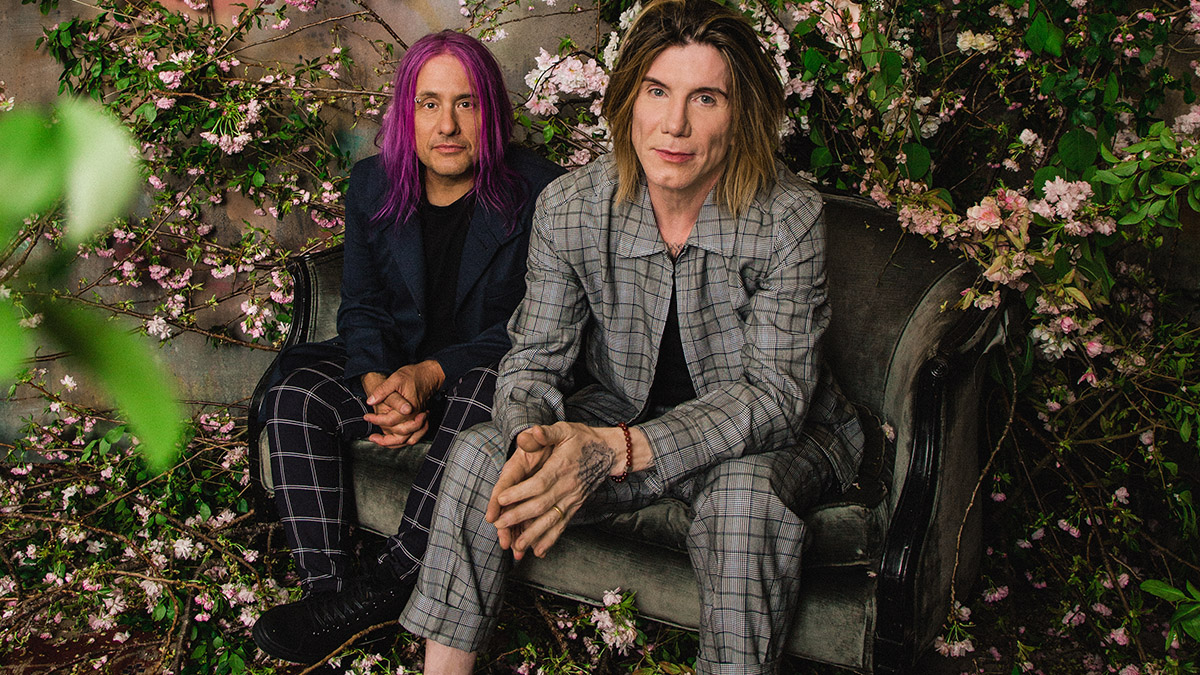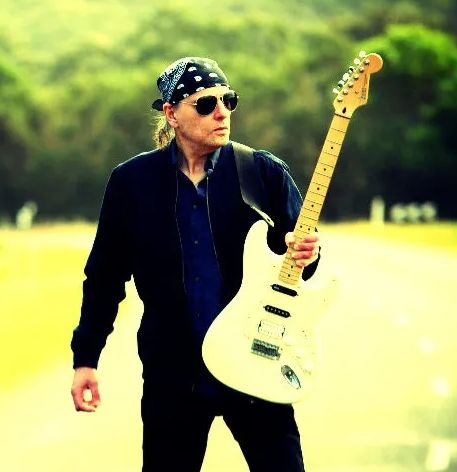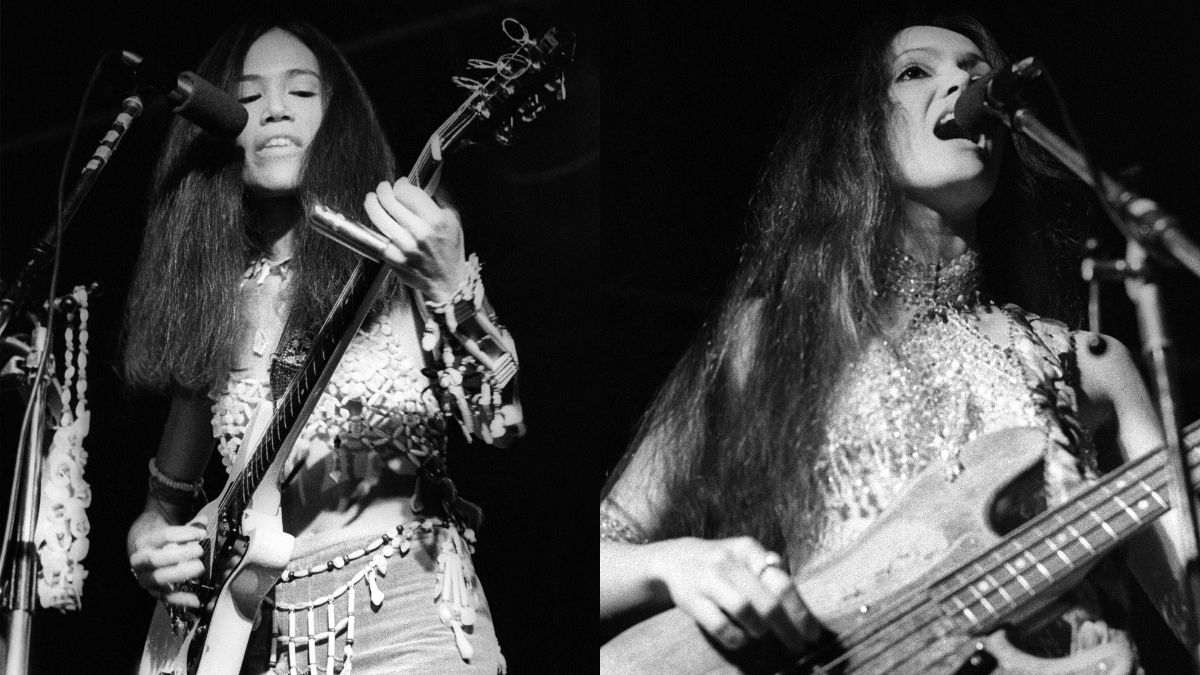Goo Goo Dolls’ John Rzeznik on taking the plunge on vintage guitars, longevity, and why he will never be a social media star
The Buffalo, NY, rock stalwarts return with Chaos in Bloom, a record produced by Rzeznik, featuring some truly epicurean tones. Here, the guitarist tells us how it all came together

All the latest guitar news, interviews, lessons, reviews, deals and more, direct to your inbox!
You are now subscribed
Your newsletter sign-up was successful
Chaos in Bloom is the Goo Goo Dolls 13th studio album and on the new album, the band continue building upon their musical legacy and unique guitar sound, by sounding more confident than ever before.
The stadium-ready choruses and spear-sharp songwriting are underscored by monstrous guitar tones courtesy of frontman and guitarist John Rzeznik.
Guitar World recently sat down with Rzeznik to discuss the new album, vintage guitars and the secret to the band's longevity.
This is the first time you have produced one of the band’s albums. Was it an arduous task having to also wear a producer’s hat as well?
“Doing the writing and producing the music wasn’t too hard as I was really comfortable doing that, but when it came time to sing, it became obvious that I was over my head and I needed to bring in my friend Gregg Wattenberg to produce the vocals at the end because I couldn’t be objective about it.”
Has the song writing process changed much for you over the years?
“I think I’m more comfortable in sitting with the certainty of it where it’s like, ‘Don’t panic, everything is okay, and you’re just going to write a song’. I still panic a little though but it’s not as intense for me now to put a song together. It doesn’t feel like such an overwhelming task.”
All the latest guitar news, interviews, lessons, reviews, deals and more, direct to your inbox!
Now that you’re in your fourth decade in this business, do you know which songs are going to work for a record and an audience as soon as they are written?
“At a certain point you get a feeling about each song where it’s, ‘yeah that’s a good album track or something’ and then you try and up the game on that one. We ended up having two albums’ worth of material on the writing sessions for this album, and I kind of picked through what I thought were the best of them all. You really pick the ones you like the best and just hope that other people will like them too.”
I love the guitar tones on the album, what guitars did you use to achieve those sounds?
“Over a couple years I finally went out and bought myself, and also put together a nice collection of really beautiful vintage guitars as I’ve never really owned any of that kind of stuff before. I looked at it as a kind of tone palette, like 180 degrees from thin to thickest.
I love mini-humbuckers. They’re so focused
“I got myself a Tele, a Strat, a Jazzmaster – which is what I used the most on the new record – a Jaguar, and an Epiphone Sheraton and a Les Paul Deluxe both with mini-humbuckers as I love mini-humbuckers. They’re so focused. Also in there is a Les Paul and an SG. All of those guitars covered the whole tonal palette.
“I also had some of the newer guitars too, like a Rock N’ Roll Relics which is an incredible guitar. The way those guitars play and look, the choice of pickups – mine has the FilterTrons on it – and the craftmanship that goes into them, is just amazing. You can especially hear that guitar on the single Yeah, I Like You.”

And what about acoustic guitars?
“There was a Martin, a Gibson J-50 and a Taylor. The J-50 is such a great sounding guitar to record with. It’s a very well-behaved sounding guitar.”
Turning to amps now, what were your go-to guitar amps?
“An Ampeg Gemini, an old Fender Blackface Pro Reverb, and a Silverface one as well, a Victoria Tweed Champ and for the really big heavy guitar sounds, I used a Naylor Super-Drive 60 through an old 4 x 12” Orange cabinet which I think had Eminence speakers in it.
I put two original Klon pedals through two different amps, that were set two different ways a lot of the time and which made a stereo sound with the guitars that was kind of cool
“I put two original Klon pedals through two different amps, that were set two different ways a lot of the time and which made a stereo sound with the guitars that was kind of cool.
“To capture those sounds, a lot of old ribbon microphones were used, like Neumann U-67s on the guitar amps which sounded unbelievable. Also, a couple of AEA N22s which are beautiful ribbon mics that sound great on electric guitars and a Beyerdynamic M160.”
You mentioned the Klon pedal, was that your main effect pedal?
“No, I also had a Keeley Dark Side Workstation which is like having two pedals in one; one side is like time-based effects and the other side is like a fuzz, and a Sovtek Civil War Big Muff which is a Soviet era Big Muff.
“For the overdriven tones, I did a lot of experimenting with an RC Booster into a Klon and hitting the pedal harder and then messing around with the Klon and also an old Ross Compressor. Just using a lit bit of that just added this certain kind of tubbiness and sustain to the tone that was really cool.”
Did you experiment much with any new tunings on this album?
“Only out of necessity. On Yeah, I Like You, I cut the high E string off the guitar because it was just getting in the way and so I only used the five strings in standard tuning for that song.
“There were some other crazy things I tried too like dropping the E down to a D a couple of times. But on this record, I tried to do as much as possible in standard tuning or by taking a string down or by putting a capo on a standard tuned guitar.”
I didn’t even know if we were ever going to get out on the road again or be able to make another record... it was unsettling and I think the album reflects that
The pandemic obviously gave you lots of time for reflection as it’s something that comes through clearly in the album’s lyrical material, which deals with everything from inequality to social media culture.
“Yeah, these things kind of just came to me as I was home a lot more and there was so much uncertainty going on in the world. I didn’t even know if we were ever going to get out on the road again or be able to make another record. We truly had no idea as to what was going on, so it was unsettling and I think the album reflects that.
“For example, the song Going Crazy came out of an experience I had when we were recording in LA. I had found myself on Sunset Boulevard and literally had walked into the middle of an enormous protest march as it was all happening. I hung around and it really had a profound effect on my head and it affected me a little bit more than I originally thought.
“Then I started thinking about the reasons they were there, which was because of the inequality and inequity which has been reaching boiling point everywhere.”
Having achieved longevity in this business you’ve weathered a lot of the changes the industry has experienced in that time. Is there an advice you can offer to those younger musicians coming through?
“The industry has changed so much from when I started that the path to being successful has changed so much too. It was a pretty strict path back then when there was no internet.
You have to be on all these numerous social media platforms and be constantly in touch, and man, I don’t want that
“It wasn’t easy to get on that path and wasn’t easy to do, but it was pretty obvious; you would make the record, give it to the label, the label took it to radio, radio either played it or not and if radio did play it, you’d go out on tour and you’d sell records. And that was how it all worked, but now it is a very circuitous process where you have to be on all these numerous social media platforms and be constantly in touch, and man, I don’t want that.
“When I talk to young musicians, they talk to me about building their brand and I’m like, ‘Do you want to be a songwriter or do you want to, you know, sell make up?’ Or is this music thing a jumping off point for your acting?”
Looking back over your entire Goo Goo Dolls catalog, is there anything you would if you could, go back and change now?
“With our first album we only had three days to make it in Buffalo, New York in 1986 and on a $700 budget. And the engineer had just bought himself a rack mounted Rockman and so he was like, ‘you’ve got to use this!’ And it sounds so horrible and is the worst guitar tone ever.
“I wish I could go back and replay all those guitars on that record. But if I look back too hard, I’m just going to go crazy about it and then I may go and release a new version of an album, and that never really ever works. But to be honest, I just accept it as that album captures a time and a place and a mindset and an age that I was, at that point in time.”
- Chaos in Bloom is out now via Warner Records.
Joe Matera is an Australian guitarist and music journalist who has spent the past two decades interviewing a who's who of the rock and metal world and written for Guitar World, Total Guitar, Rolling Stone, Goldmine, Sound On Sound, Classic Rock, Metal Hammer and many others. He is also a recording and performing musician and solo artist who has toured Europe on a regular basis and released several well-received albums including instrumental guitar rock outings through various European labels. Roxy Music's Phil Manzanera has called him, "... a great guitarist who knows what an electric guitar should sound like and plays a fluid pleasing style of rock." He's the author of Backstage Pass: The Grit and the Glamour.






